The Pursuit of Happyness
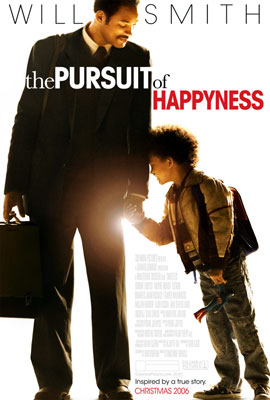
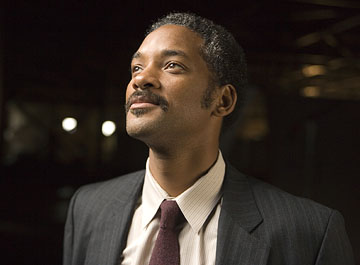 The film is based on the true story of Chris Gardner (Will Smith), a man struggling to get by to support his family, including frustrated wife Linda (Thandie Newton) and 5-year-old son Christopher (played by Smith's real life son, Jaden Christopher Syre Smith). A couple years ago, Chris invested all of his savings into a company that sells devices that test bone density. He's forced to make his way across the city, lugging the massive and bulky devices around, hoping to sell them to hospitals, but business has been bad since the very beginning and show no signs of improving anytime soon. With the bills and other expenses piling up at an alarming rate, Linda reaches the end of her rope, and walks out on Chris. Alone for the first time, Chris must find a way to build a better life for him and his son, and thinks he's found the answer when he learns of an internship program at a large stock broker firm. It is a competitive and cutthroat internship program, and one that pretty much guarantees failure, since only one person of the 20 selected will actually be chosen for a real career. When Chris is eventually evicted from his own apartment, and forced to move both him and his son through a large variety of temporary homes (everything from numerous homeless shelters to an empty men's room in a subway station), he becomes more determined than ever to prove to himself that he's worth more than anyone ever thought.
The film is based on the true story of Chris Gardner (Will Smith), a man struggling to get by to support his family, including frustrated wife Linda (Thandie Newton) and 5-year-old son Christopher (played by Smith's real life son, Jaden Christopher Syre Smith). A couple years ago, Chris invested all of his savings into a company that sells devices that test bone density. He's forced to make his way across the city, lugging the massive and bulky devices around, hoping to sell them to hospitals, but business has been bad since the very beginning and show no signs of improving anytime soon. With the bills and other expenses piling up at an alarming rate, Linda reaches the end of her rope, and walks out on Chris. Alone for the first time, Chris must find a way to build a better life for him and his son, and thinks he's found the answer when he learns of an internship program at a large stock broker firm. It is a competitive and cutthroat internship program, and one that pretty much guarantees failure, since only one person of the 20 selected will actually be chosen for a real career. When Chris is eventually evicted from his own apartment, and forced to move both him and his son through a large variety of temporary homes (everything from numerous homeless shelters to an empty men's room in a subway station), he becomes more determined than ever to prove to himself that he's worth more than anyone ever thought.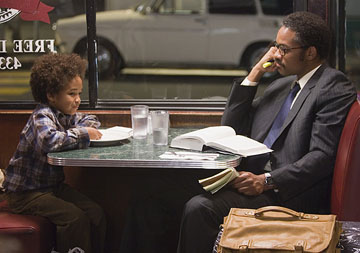 The Pursuit of Happyness (the alternative spelling of the word "happiness" in the title coming from a graffiti message found near young Christopher's day care) is the kind of formula film that works. It is the way the story is told rather than the story itself that is the key to its success. In making his US movie debut, Itallian filmmaker Gabriele Muccino has brought us a formula movie that works, because it avoids most of the traps that other similar films fall into. The movie strives for a somewhat realistic approach, rather than playing up the melodrama, and the characters are crafted realistically and in a likeable manner. The screenplay by Steve Conrad (The Weather Man) is too smart to fall back on familiar character types. I was especially impressed by how the character of Linda is handled. She is not portrayed as a monster for walking out on her family, but tries to understand her frustrations and her feelings. The movie does not try to vilify or look down upon her. She is simply a woman who has lost faith that things will get better, and can no longer hide her pain behind the forced smile she shows her son. Everything is treated in the same respectable fashion, and the movie never once talks down to us. All of the characters are well rounded and have dimensions, and although the story may be predictable, the movie earns its emotional response by not hitting us over the head with long-winded speeches or an overpowering music score designed to play up the emotion of the scene. The sense of realism can be found right down to the production design, which accurately recreates life in the early 80s due to a number of small touches and props that are taken straight from that point of time.
The Pursuit of Happyness (the alternative spelling of the word "happiness" in the title coming from a graffiti message found near young Christopher's day care) is the kind of formula film that works. It is the way the story is told rather than the story itself that is the key to its success. In making his US movie debut, Itallian filmmaker Gabriele Muccino has brought us a formula movie that works, because it avoids most of the traps that other similar films fall into. The movie strives for a somewhat realistic approach, rather than playing up the melodrama, and the characters are crafted realistically and in a likeable manner. The screenplay by Steve Conrad (The Weather Man) is too smart to fall back on familiar character types. I was especially impressed by how the character of Linda is handled. She is not portrayed as a monster for walking out on her family, but tries to understand her frustrations and her feelings. The movie does not try to vilify or look down upon her. She is simply a woman who has lost faith that things will get better, and can no longer hide her pain behind the forced smile she shows her son. Everything is treated in the same respectable fashion, and the movie never once talks down to us. All of the characters are well rounded and have dimensions, and although the story may be predictable, the movie earns its emotional response by not hitting us over the head with long-winded speeches or an overpowering music score designed to play up the emotion of the scene. The sense of realism can be found right down to the production design, which accurately recreates life in the early 80s due to a number of small touches and props that are taken straight from that point of time.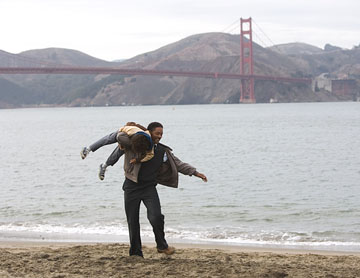 The strongest asset that The Pursuit of Happyness has is in its depiction of Chris Gardner himself. The movie is wise not to whitewash his character, or make him so much of a "saint" that we find the story hard to swallow. Chris is a flawed human being, and one that anyone struggling through life is sure to identify with. He becomes frustrated and sometimes takes his anger out on his son in a fit of yelling, he is once forced to flee from a cab when he discovers he doesn't have enough money to pay for the ride, and he often comes close to breaking down. Through it all, it is his determination and spirit that carries him through, and he comes across as a genuine individual instead of an overly glorified movie depiction of a real person. A lot of this credit goes to Will Smith, who gives an Award-worthy performance that immediately grabs our attention. It gets to the point that we feel we are not watching Will Smith playing a struggling single father, that's how completely he is able to disappear into his character. He never once draws attention to himself or steps out of character, and he is constantly believable and heartfelt in both his performance and his line delivery. There is a small scene where Chris is forced to take shelter in a public men's room, and is holding onto his sleeping son, as he attempts to hold onto what little faith he has left in himself. A lesser movie would have played up the melodrama of this moment, but this movie plays it small and honest, and his heartbreak is clear to see on his face without a single line of dialogue.
The strongest asset that The Pursuit of Happyness has is in its depiction of Chris Gardner himself. The movie is wise not to whitewash his character, or make him so much of a "saint" that we find the story hard to swallow. Chris is a flawed human being, and one that anyone struggling through life is sure to identify with. He becomes frustrated and sometimes takes his anger out on his son in a fit of yelling, he is once forced to flee from a cab when he discovers he doesn't have enough money to pay for the ride, and he often comes close to breaking down. Through it all, it is his determination and spirit that carries him through, and he comes across as a genuine individual instead of an overly glorified movie depiction of a real person. A lot of this credit goes to Will Smith, who gives an Award-worthy performance that immediately grabs our attention. It gets to the point that we feel we are not watching Will Smith playing a struggling single father, that's how completely he is able to disappear into his character. He never once draws attention to himself or steps out of character, and he is constantly believable and heartfelt in both his performance and his line delivery. There is a small scene where Chris is forced to take shelter in a public men's room, and is holding onto his sleeping son, as he attempts to hold onto what little faith he has left in himself. A lesser movie would have played up the melodrama of this moment, but this movie plays it small and honest, and his heartbreak is clear to see on his face without a single line of dialogue.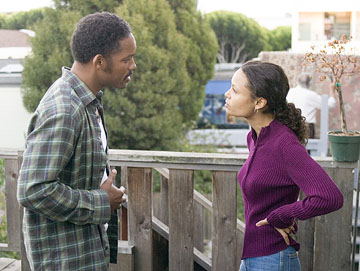 Having Will Smith's actual son play his character's son in the movie initially sounds like a desperate piece of stunt casting, and could have endangered the movie had it not worked out right. Fortunately, young Jaden Christopher Syre Smith knows how to be an appropriate little scene stealer without coming across as an overly cute or forced "movie kid". He gets a few difficult dramatic scenes, such as the sequences where he struggles to understand what is happening to his father and him, and why they are forced to move around so much. He is natural in front of the camera, and never seems to be playing or mugging for the screen. The supporting cast is equally strong, with everyone hitting the proper notes. The bosses at the stock broker firm are well rounded, and never come across as being overly stuffy, or overly sympathetic to Chris' plight, either. They come across as being just as genuine as the main characters, and include some fine performances from Brian Howe as the man who initially gives Chris the opportunity to take the internship, and cartoon voice actor Dan Castellaneta (best known as the voice of Homer Simpson) making a rare live action appearance as the teacher of the internship course.
Having Will Smith's actual son play his character's son in the movie initially sounds like a desperate piece of stunt casting, and could have endangered the movie had it not worked out right. Fortunately, young Jaden Christopher Syre Smith knows how to be an appropriate little scene stealer without coming across as an overly cute or forced "movie kid". He gets a few difficult dramatic scenes, such as the sequences where he struggles to understand what is happening to his father and him, and why they are forced to move around so much. He is natural in front of the camera, and never seems to be playing or mugging for the screen. The supporting cast is equally strong, with everyone hitting the proper notes. The bosses at the stock broker firm are well rounded, and never come across as being overly stuffy, or overly sympathetic to Chris' plight, either. They come across as being just as genuine as the main characters, and include some fine performances from Brian Howe as the man who initially gives Chris the opportunity to take the internship, and cartoon voice actor Dan Castellaneta (best known as the voice of Homer Simpson) making a rare live action appearance as the teacher of the internship course.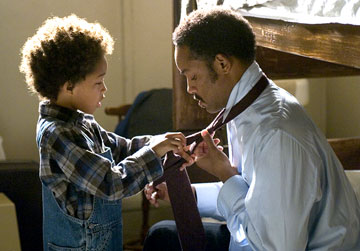
Much like last weekend's The Holiday, The Pursuit of Happyness is a formula movie that knows how to play by the rules of the genre, but does so in a way that makes it stand out. It earns the emotions that it strives for not by trying too hard, but simply by making us relate to the characters and the situations. It is something that few "based on a true story" inspirational dramas know how to do. It respects us as an audience, and never once tries to make itself appear grander than it actually is by pumping up the portrayals of the people behind the story into stereotypes. By the end, we generally feel happy, not manipulated. It amazes me how few films are able to understand this. The Pursuit of Happyness certainly does.
See the movie times in your area or buy the DVD at Amazon.com!






0 Comments:
Post a Comment
<< Home